Indulge in the delightful citrusy-sweet flavors of this Vegan Lemon Loaf with this recipe inspired by the classic Starbucks treat. This vegan version captures the same moist and tangy flavors you love, without any of the dairy or eggs. Let's learn how to make it!
This post may contain affiliate links. Read my full disclosure here.

Nothing beats a fun copycat recipe! This one is for all the Starbucks lovers out there. The lemon loaf is a dessert case staple and now you can make it at home free of dairy and eggs!
We love lemon desserts around here - this Vegan Lemon Loaf as well as our Vegan Lemon Poppy Seed Cookies and Vegan Lemon Blueberry Scones are some of our favorites.
This recipe comes together in 1 bowl and requires only 15 minutes of active prep time. What are you waiting for!?
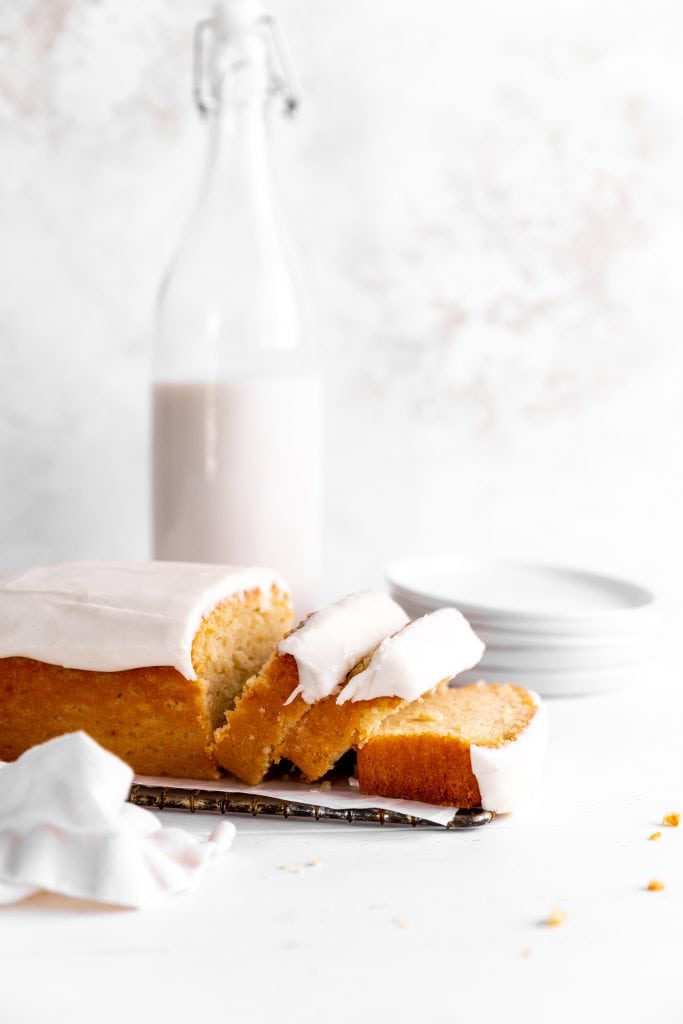
Vegan Lemon Loaf Ingredients
- Sugar: Sugar provides sweetness to the vegan lemon loaf, balancing the tartness of the lemon. It also helps create a moist and tender texture.
- Lemon Zest: Lemon zest adds intense citrus flavor to the loaf, elevating its flavor and aroma.
- Lemon Juice: Lemon juice is a crucial ingredient that infuses the loaf with tangy and refreshing flavors.
- Vegan Butter: Vegan butter adds richness, moisture, and a buttery flavor to the loaf. It also ensures a luscious mouthfeel, making the loaf satisfying and indulgent.
- Nondairy Milk: Nondairy milk, such as almond or soy milk, adds moisture to the batter, contributing to a moist and soft texture.
- Nondairy Yogurt: Nondairy yogurt adds tanginess, leavening power and moisture to the lemon loaf.
- Vanilla Extract: Vanilla extract adds depth and enhances the overall flavor profile of the loaf.
- Baking Powder: Baking powder acts as a leavening agent, helping the loaf rise and become light and fluffy.
- Baking Soda: Baking soda interacts with the lemon juice to create additional lift and lightness in the loaf.
- Sea Salt: Sea salt enhances the overall flavor balance of the loaf.
- All Purpose Flour: All-purpose flour acts as the base ingredient, providing structure and texture to the loaf.

Lemon Glaze Ingredients
- Vegan Butter: Vegan butter in the glaze adds richness and a creaminess.
- Powdered Sugar: Powdered sugar is the key ingredient in the glaze, providing sweetness and a glossy texture.
- Lemon Juice: Lemon juice in the glaze enhances the tangy citrus flavor.
- Nondairy Milk: Nondairy milk in the glaze helps achieve the desired consistency and creaminess.
- Vanilla Extract: Vanilla extract adds depth and complexity to the glaze, balancing the sweetness and tanginess.
- Salt: A pinch of salt in the glaze helps balance the sweetness and intensifies the flavors.
How to Make Vegan Lemon Loaf (with pictures!)
Please see the recipe card at the bottom of the page for full instructions and ingredient measurements.
Start by rubbing together the granulated sugar and lemon zest together in a large mixing bowl. This will infuse the lemon flavor into the sugar. Add in the rest of the ingredients minus the flour. Mix until smooth and ingredients are evenly distributed. Sift in the flour and mix until just combined. Do not over-mix.
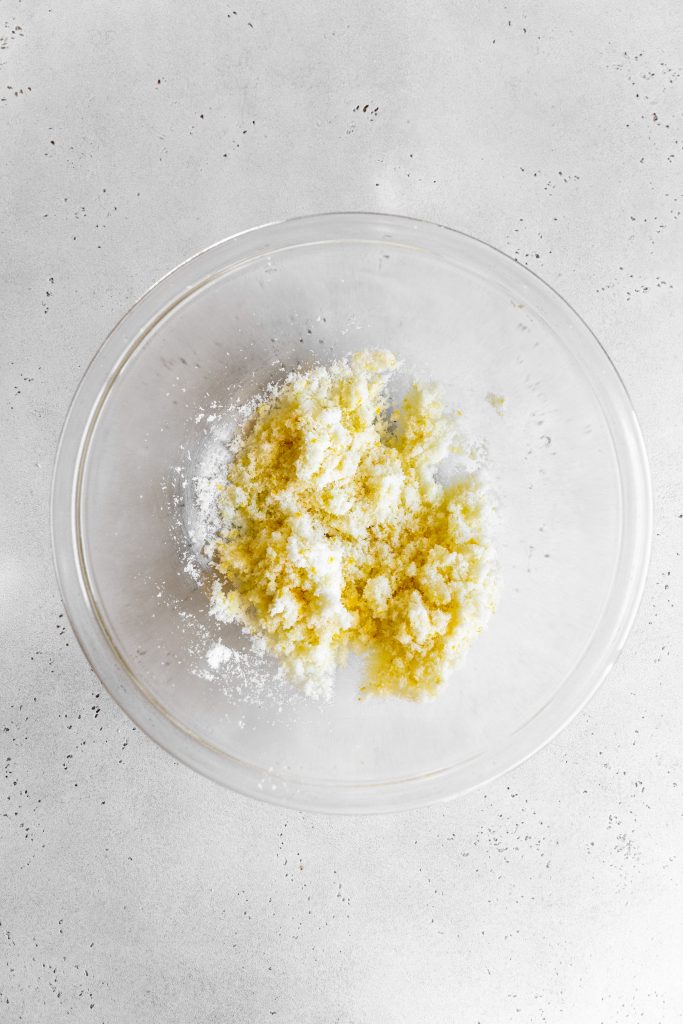
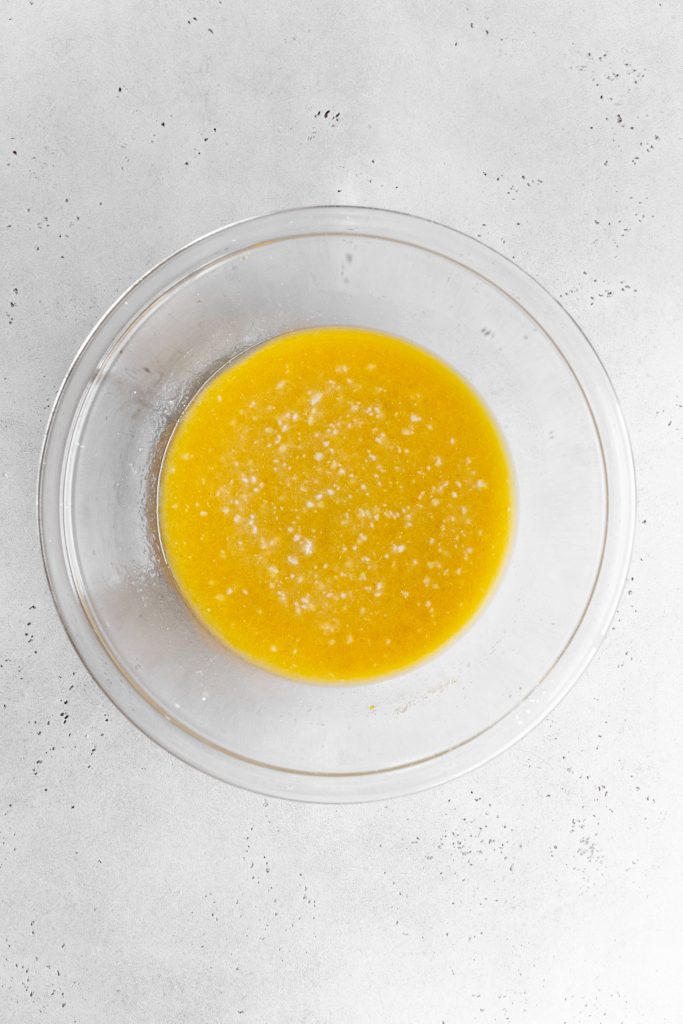
Pour the batter into an 8 inch loaf pan lined with parchment paper. Bake on center rack of an oven preheated to 350 degrees F for 50-55 minutes.
To make the lemon glaze, whisk all of the ingredients together in a small bowl until smooth. Add an additional tablespoon of lemon juice if necessary. Spread over the top of cooled loaf allowing some of the icing to drizzle down the sides.
Set in the refrigerator to chill for 30 minutes to solidify the icing. Slice and serve.
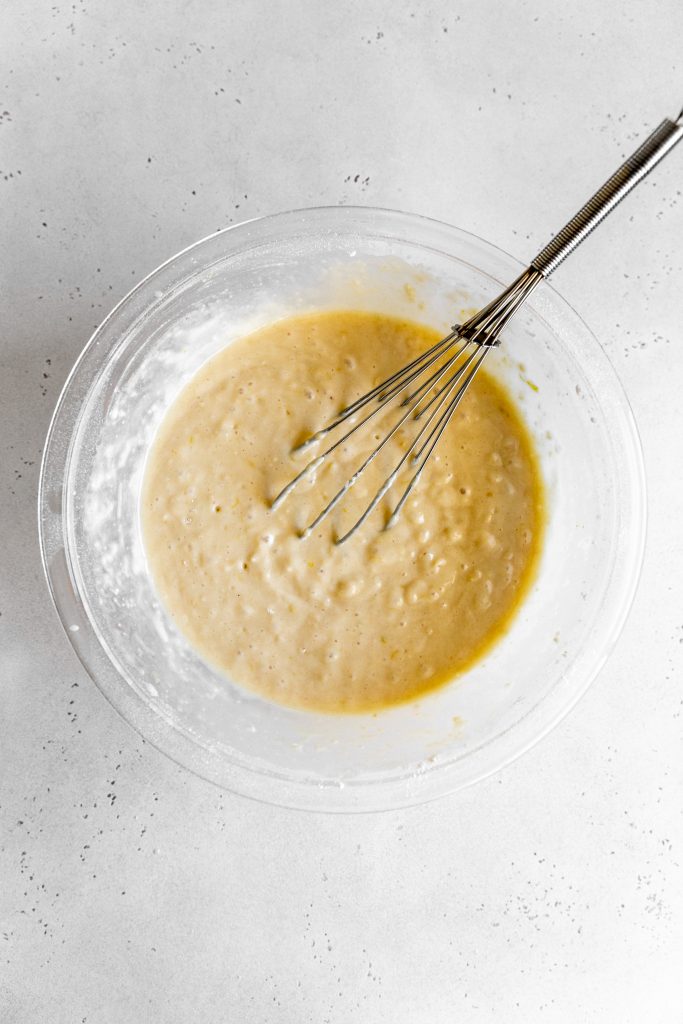
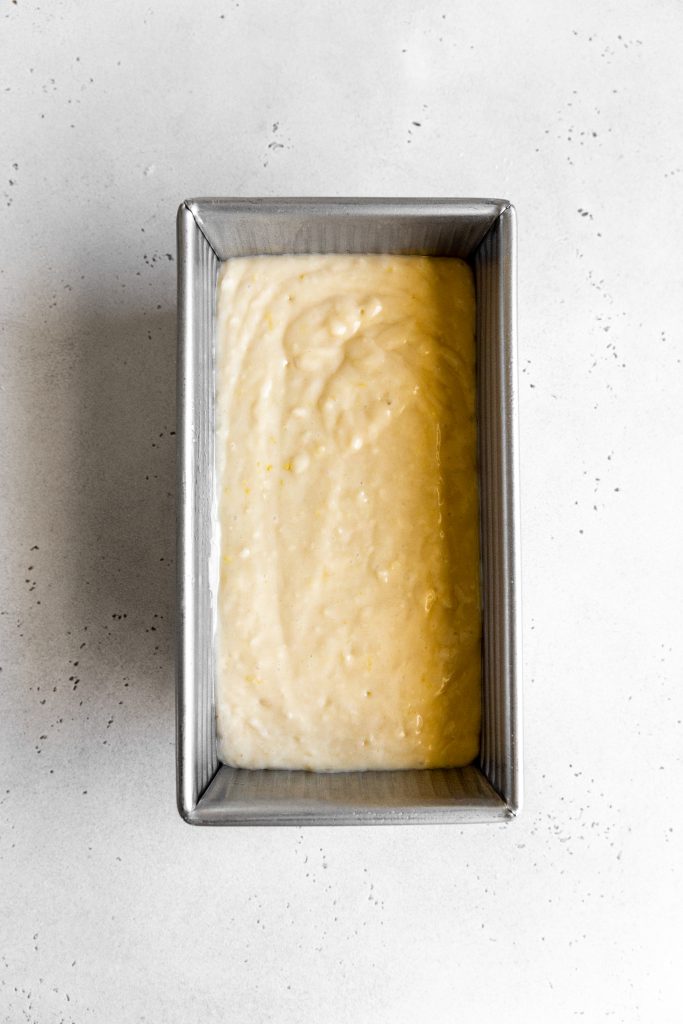
Fresh vs Bottled Lemon Juice in Baking
Using fresh lemon juice versus bottled lemon juice in baking can yield slightly different results due to variations in flavor and acidity. Here's a breakdown:
Fresh Lemon Juice
- Flavor: Fresh lemon juice typically has a brighter and more vibrant flavor compared to bottled lemon juice. It retains more of the natural oils present in the lemon peel.
- Acidity: The acidity of fresh lemon juice can vary depending on factors such as the ripeness of the lemons and the specific variety used. Generally, it tends to be slightly more acidic than bottled lemon juice.
- Consistency: Since fresh lemon juice is perishable, its acidity and flavor can degrade over time if not used promptly. Use fresh lemon juice soon after it's squeezed for optimal results.
Bottled Lemon Juice
- Flavor: Bottled lemon juice is convenient and has a consistent flavor profile. However, it may lack the brightness and complexity of fresh lemon juice due to the processing methods used to preserve it.
- Acidity: Bottled lemon juice often undergoes pasteurization, which can alter its acidity levels.
- Consistency: Bottled lemon juice has a longer shelf life compared to fresh lemon juice since it's preserved. It's convenient for recipes that require lemon juice in larger quantities or when fresh lemons are not readily available.
While fresh lemon juice is almost always preferred in baking, bottled can be used in circumstances where fresh isn't available.

Tips for Making a Perfect Vegan Lemon Loaf
- Use fresh lemons: For the best flavor, use freshly squeezed lemon juice and grated lemon zest. It will subsequently provide a vibrant citrus taste that cannot be replicated with bottled juice or pre-packaged zest.
- Choose high-quality vegan butter: Opt for a high-quality vegan butter or margarine to ensure a rich and buttery flavor in your loaf. Look for brands that are specifically labeled as vegan to ensure they are free from any animal-derived ingredients.
- Don't over-mix the batter: When combining the wet and dry ingredients, mix just until everything is incorporated. Over-mixing can lead to a dense and tough texture in the final loaf.
- Adjust the glaze consistency: When preparing the glaze, adjust the amount of lemon juice and non-dairy milk to achieve your desired consistency. For a thicker glaze, use less liquid, and for a thinner glaze, add more liquid. Drizzle the glaze over the cooled loaf for a picture-perfect finish.
- Let the loaf cool completely: Allow the lemon loaf to cool in the pan for an hour before transferring it to a wire rack to cool completely. This will help the loaf retain its shape and prevent it from crumbling when slicing.
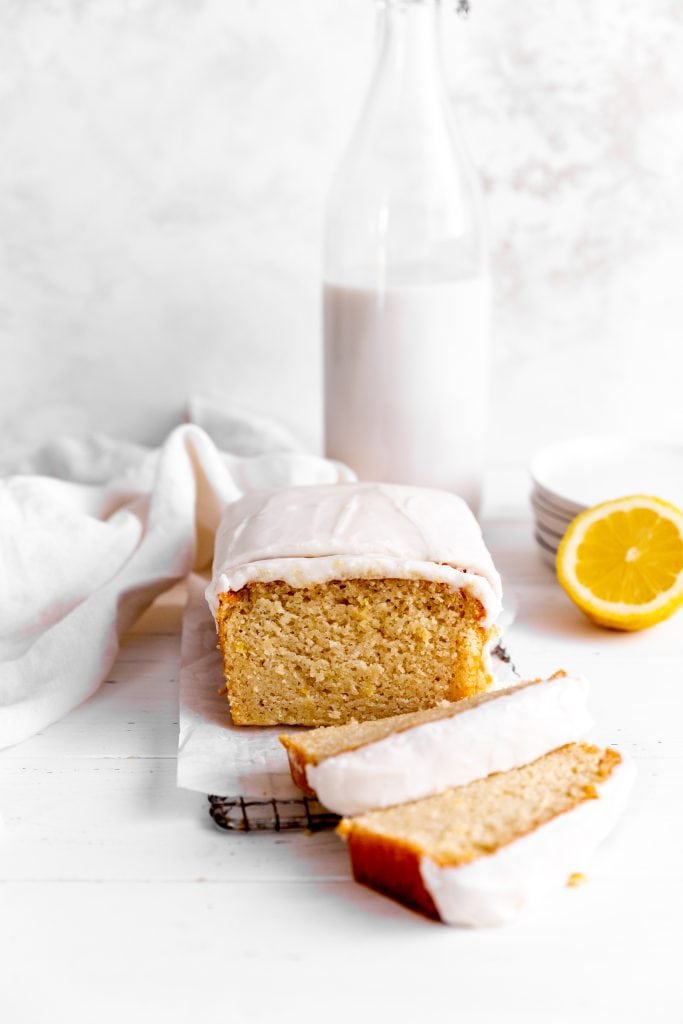
Why is My Lemon Loaf Dense?
There are several factors that can contribute to a dense lemon loaf. Here are some possible reasons and suggestions to help troubleshoot the issue:
- Over-mixing the Batter: Over-mixing the batter can develop gluten in the flour, resulting in a dense and tough texture. When combining the wet and dry ingredients, mix just until everything is incorporated.
- Incorrect Measuring of Ingredients: Baking is a science, and accurate measurements are crucial. Ensure you are using the correct measuring tools and techniques.
- Insufficient Leavening Agents: The leavening agents, such as baking powder and baking soda, are responsible for the rise and lightness of the loaf. If the leavening agents are not fresh or have expired, they may not provide enough lift.
- Oven Temperature: Incorrect oven temperature can affect the loaf's rise and texture. Accordingly. use an oven thermometer to verify that your oven is reaching and maintaining the correct temperature as stated in the recipe.
- Over-baking: Baking the loaf for too long can also lead to a dense texture. Check for doneness by inserting a toothpick or cake tester into the center of the loaf.
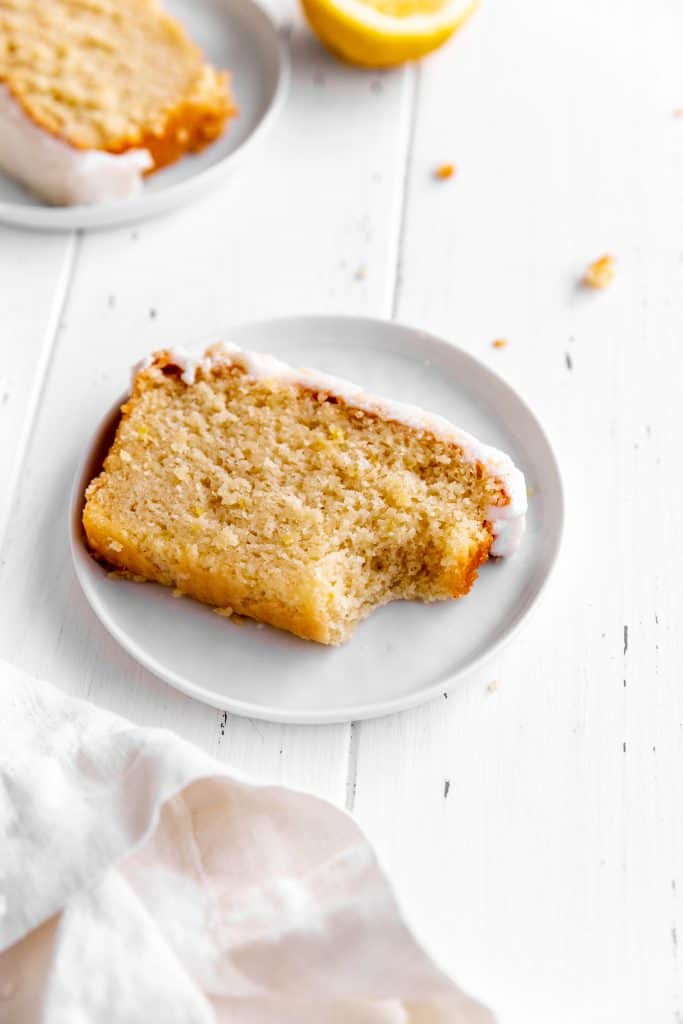
Frequently Asked Questions
To prevent a dry loaf, make sure not to over-mix the batter, as over-mixing can develop too much gluten and result in a tough texture. Additionally, be careful not to over-bake the loaf. Bake it just until a toothpick inserted into the center comes out clean with a few moist crumbs attached.
While you can experiment with different flours, using all-purpose flour typically yields the best texture for a classic lemon loaf. Whole wheat flour may result in a denser loaf, while almond flour may make the loaf too crumbly. If using alternative flours, you may need to adjust other ingredients accordingly.
While fresh lemon juice provides the best flavor, you can use bottled lemon juice as a substitute if fresh lemons are not available. Just make sure to use pure lemon juice without any added sweeteners or preservatives.
Yes, you can substitute melted coconut oil for vegan butter in the lemon loaf recipe. However, keep in mind that coconut oil may impart a subtle coconut flavor to the loaf. If you prefer a more neutral flavor, opt for refined coconut oil, which has a milder taste.
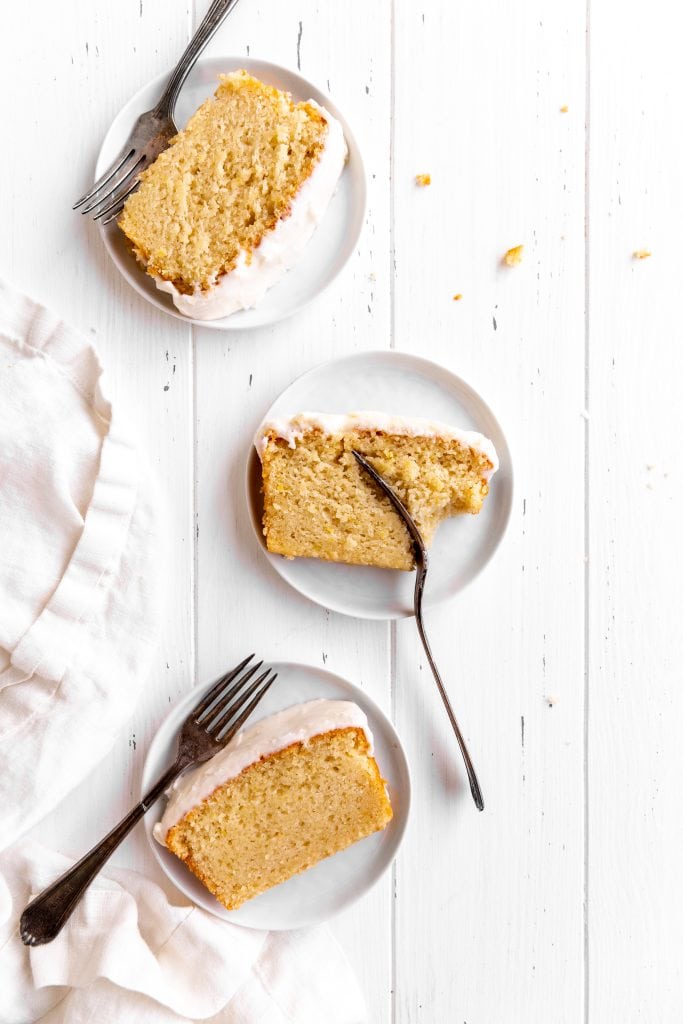
Storage
This Vegan Lemon Loaf will keep in an airtight container at room temperature for 2-3 days. An unfrosted lemon loaf can be frozen for up to 1 month.
If you make this recipe please tag @censoredbaker on Instagram and leave a review below!
PrintVegan Lemon Loaf (Starbucks Copycat)
Moist, citrusy lemon cake loaf drizzled in a tangy lemon glaze. Inspired by the classic Starbucks treat.
- Prep Time: 15 minutes
- Bake Time: 55 minutes
- Total Time: 1 hour 10 minutes
- Yield: 1 8-inch Loaf 1x
- Category: Bread
- Method: Bake
- Cuisine: American
- Diet: Vegan
Ingredients
For the Loaf
1 c sugar
2 tbsp lemon zest
¼ c lemon juice
½ c vegan butter, melted and cooled to room temperature
½ c nondairy milk
½ c nondairy yogurt
1 tsp vanilla extract
2 tsp baking powder
½ tsp baking soda
½ tsp sea salt
2 c all purpose flour
For the Lemon Glaze
1 tbsp vegan butter, softened
2 c powdered sugar
1 tbsp lemon juice
1 tbsp nondairy milk
½ tsp vanilla extract
pinch of salt
Instructions
- Prep: Preheat oven to 350 degrees F (175 C) and line an 8 inch loaf pan (1 pound) with parchment paper. Set aside. Combine sugar and lemon zest in a large bowl. Rub the lemon zest into the sugar using your fingers for about 1 minute. Your sugar should begin to turn yellow and the lemon will become fragrant. This will infuse your sugar with the lemon flavor.
- Make the Batter: Add lemon juice, melted vegan butter, nondairy milk, nondairy yogurt and vanilla to the bowl. Whisk until completely smooth. Add baking powder, baking soda and salt to the liquid mixture. Whisk gently to evenly disperse the leaveners. Sift the flour into the bowl and whisk until the batter just comes together. Do not over-mix.
- Bake: Pour batter into the prepared loaf pan and place on center rack of preheated oven. Bake for 50-55 minutes or until toothpick inserted into the center of loaf comes out clean with a few crumbs clinging to it. Allow loaf to cool in pan for an hour before transferring to a wire rack to cool completely.
- Make the Lemon Glaze: While the lemon loaf is cooling, prepare the lemon glaze. Add all of the ingredients to a bowl and whisk vigorously until completely smooth. You want the glaze to be thick but spreadable. Add an additional tablespoon of lemon juice if necessary. Once the loaf is totally cooled, spread the glaze over the top of the loaf. Allow some of the glaze to roll off and run down the sides. Place loaf in the fridge for 30 minutes to firm up the icing. Slice with a sharp knife to serve.
Notes
*Prepared loaf will keep in a sealed container at room temperature for 2-3 days. Unfrosted loaf can be frozen for up to 1 month.
*After about 30 minutes, the top of your lemon loaf may start to darken. At this point, cover the pan with tinfoil to protect for the remainder of the baking time.
More Vegan Lemon Dessert Recipes
- Vegan Lemon Poppy Seed Cookies
- Vegan Lemon Blueberry Scones
- Vegan Lemon Poppyseed Layer Cake
- Vegan Lemon Crinkle Cookies
- Vegan Lemon Blueberry Bars



Leave a Reply